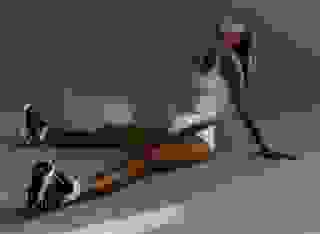Note: You can change font size, font face, and turn on dark mode by clicking the "A" icon tab in the Story Info Box.
You can temporarily switch back to a Classic Literotica® experience during our ongoing public Beta testing. Please consider leaving feedback on issues you experience or suggest improvements.
Click hereWe hear Abed open the inner office. Seconds later, he and Fadil are back, each carrying a hefty stack of yellowing newspapers.L'Orient Le Jour, Lebanon's major French daily. It would appear that these back issues have been sitting out front the entire time we've been here. I gush gratefully. Allan plays it cooler, of course.
My exposure to French is limited to a semester-long crash course I took during my first year of graduate school to prep me for my reading exam, which is to say that I can't actually read French without a dictionary. But I search for news stories on more or less familiar subjects (the back issues are all from 1985), so I can practice decoding from context. How I have missed this type of intellectual stimulation! Allan helps me improve my pronunciation, which wasn't covered systematically in my reading comprehension course.
We remind Abed periodically that we would be grateful for something else to read. In the meantime, these old newspapers make our days less tedious, especially the days of enforced silence when the Brothers Kalashnikov are on duty. Shortly after we've been given the newspapers, the Brothers K become willing to leave our light on for us. I'm convinced that Abed must have said something to them.
This is our new life as we move through December, on our way to the end of 1986.
***
I miss the huddling. I'm extraordinarily thankful that Allan and I are still together in the same room. At the same time, I hate the enforced distance, and I hate the chef for imposing it. After Abed and Fadil relocate the filing cabinet, there are only two or three yards between my head and Allan's, but that's more distance between us than we're used to. We've never slept so far from each other before. Back in the Shouf prison, that distance would have been a whole cell away. It's as far away as we were from Paul and Donald.
I miss lying next to Allan. I miss that we can never touch. Never a pat on the shoulder. Not even hands on ankles as one of us does sit-ups.
I worry that the chef has done this to us because he knows about me. Or suspects—has suspected from the beginning. He can see it or hear it, in my voice, my movement, my posture. Maybe the crying was the clue. So when the guards told the chef that they'd found us in bed together, he jumped naturally, immediately, from suspicion to conclusion.
If so, then it's my fault that we're chained like this. My fault that we were beaten. Allan's right in a way and wrong in a way when he says we're being punished unjustly. The punishment is unjust because nothing happened, and nothing was going to happen. On the other hand, I am what we are being punished for. Allan's protestation to the chef is technically true:We aren't homosexuals. It's justme who is.
I bear the burden of responsibility, then. That's not the same as guilt; I don't feel guilty because of what has happened to us. Guilt implies that there is something I should have done differently, or could do differently now, to change things. But that's not the case here. I can't change what I am, what they detect in me. This isn't like entertaining sexual thoughts about Allan when I know I should push them away, or like when I went home with Dale even though I knew that would complicate my life in ways I shouldn't allow to happen. I feel guilty about doing those things because I could and should havenot done them. But I can't not be gay. Realistically, I can't even cover up whatever signs people may be seeing that tell them I'm gay.
So I don't feel guilty that we've been beaten and chained on suspicion of being gay. But I do feel responsible. Which makes me feel low. Which makes me wish all the more that I could be touched by Allan, or lie close to him, for comfort. The infuriating, depressing irony is: the very fact that I wish we could touch or lie close—that is, the fact that I am gay—makes me responsible for the fact that now wecan't touch or lie close.
***
Christmas comes a couple of weeks after we receive new guards. The Brothers Kalashnikov are on duty for Christmas Eve, so Allan and I have to spend the day silent. I readL'Orient Le Jour for a while, but my thoughts keep being pulled toward home. How is my family spending this day? I imagine they're trying to have as normal a Christmas as possible, but they must feel my absence as painfully as I feel theirs. I wish I could write them a letter.
I start to compose one in my head, and then the fantasy letter turns into a fantasy tape recording, in which I'm telling them about Christmas memories with them that I cherish. The fantasy is melancholy and makes me teary-eyed, but at the same I feel it's healthy. I'm not wallowing inside myself, I'm reaching out beyond myself, to them. I wish I could reach out to Allan, I wish the Brothers K would let me talk to him. I would ask him abouthis Christmas memories.
That night I want to do something as a substitute for Christmas Eve Mass, so I light a candle, stick it to the floor, and sit cross-legged on my mattress in front of it. I'm vividly aware of the chain on my wrist. I stare into the flame and silently sing Christmas carols, in my head, for maybe an hour. I probably look spaced out; Allan takes the risk of asking if I'm all right. I nod.
The next day, Christmas Day, Abed and Fadil come on shift, which allows me to initiate the conversation I'd wanted to have with Allan yesterday. We talk about our families' Christmas traditions. The exchange is both uplifting and wistful, which is to say that it's tough but I still feel glad we did it.
Normally, Abed and Fadil feed us before giving us our evening toilet run. This evening, however, they take us to the bathroom without feeding us first. As they're escorting me back down the hall, Abed at my arm, Fadil behind, I ask if we're going to get dinner. I'm thinking that maybe they forgot. "Soon," Abed promises.
For once, "soon" really means soon. The guards return to our room immediately after the toilet runs—not to bring us sandwiches, though. Instead, they arrange something in the empty part of the room beyond my mattress, near the cupboard. As part of the process, they plug the space heater into the socket that hangs from the ceiling on that side of the room. Without explaining anything, they disconnect the end of my chain from the filing cabinet so they can bring me, with my chain hanging from my wrist, over to whatever they've arranged. They sit me down, comfortably close to the space heater, on the edge of a blanket spread on the floor. They shackle my left wrist loosely to my right ankle; I can still move my left hand pretty freely while I'm sitting here, but I imagine I'd be hard put to walk, much less run. "Do not look," Abed instructs me. They unchain Allan from the bed and seat him next to me, shackling him the same way they did me.
The guards retreat a few steps behind us, whereupon Abed gives us permission to lift our blindfolds. On the blanket in front of us is a pan of baklava, a little pile of sugared almonds, and another little pile of dates. "Happy birthday, Jesus," Abed chimes from behind us.
Cynically, I think: Another photo op. Still, I'd rather communicate with my family this way than not at all, and this is very good news for Allan, assuming they're planning to send the photo to his family, too.
But it turns out the guards do not have a camera. This Christmas spread is not for show. It's just for us. In my emotionally vulnerable state, I tear up. "Thank you," Allan says, "this is very kind of you." His voice is as restrained as it always is when he shows gratitude to the guards, but his use of "very" strikes me as unusually, if subtly, emphatic.
Allan invites Abed and Fadel to sit down with us to share the goodies. Abed doesn't want to. Allan presses. He tells them this is what we do at Christmas: they gave us a gift, so we should give them a gift, even if all we have to give is sharing their gift to us. I wonder if Abed has religious objections to joining us. I would prefer the guards not stay, either. If they do, we'll have to put our blindfolds back down. Plus, I don't want to go to the work of playing host or guest or whatever my role would be here. I just want to relax with Allan.
Nevertheless, Allan persuades the guards to stay. So he and I pull our blindfolds down most of the way, and Abed and Fadil sit on the floor across from us. They have their weapons slung over their shoulders, I can see the rifle butts pointing toward the floor under their arms. Everyone except Allan starts out rather tense—as fondly as I feel toward Abed and Fadil, this level of fraternizing feels unnatural, even unsafe—but as we eat, the guards relax and enjoy the moment.
As with my birthday cake, I find I can stomach only a little of the pastry, but I enjoy the almonds and the dates. I tell Abed and Fadil I've never eaten dates before, which surprises them. Dates are very good for you, Abed advises. He urges (orders?) me to eat some more. He asks if I dislike the baklava. Not at all, I hasten to assure him, I'm just not used to food this rich.
Allan requests permission to save some baklava for later, so Abed sends Fadil to fetch our tubs for us to set the baklava aside in. From under my blindfold, I can see that until Fadil returns, Abed takes the precaution of unslinging his rifle from his shoulder and holding in it both hands, at the ready in case Allan and I try anything. What would we try? Following Allan's example, I leave some baklava in the pan for Abed and Fadil to finish, which they do in quick order.
Fadil asks a question, which Abed translates as: Do we know any "Christmas sing"? Allan maintains he can't sing, so I go solo with my favorite carol, "Adeste Fidelis," having first been enjoined by Abed not to sing loudly. As I'm singing, it dawns on me—how did I not realize this last night?—that Beirut is not all that far from Bethlehem. I have a decent voice, and the guards seem sincere in their applause afterward. They want another carol. "Silent Night?" Allan proposes. I beg off: "I think I'll cry." So Allan tries singing that one; but when he can't get the melody started right, I come in to help him and find that I'm able to keep going after all without breaking down. By the time we get to "Holy infant," Allan is carrying the tune well enough that I improvise a harmony line for the rest. Abed and Fadil are impressed.
For a third number, we do "Rudolph the Red-Nosed Reindeer" (yes, Allan answers me coolly, they know that one in England), with me adding the spoken bits between lines. Abed interrupts immediately after we've started to remind us to keep our voices down, which smashes a dent in the cheery mood. The guards' reaction to that song is tepid. They don't ask for another.
Fadil asks another question, but instead of translating, Abedtsks at him. When Allan asks what the question was, Abed replies only that it wasn't polite. That's okay, I say. If there's something Fadil wants to know, we're happy to answer, we won't be offended. Abed hesitates. Allan jokes that we won't be able to sleep tonight, wondering what Fadil's question was.
Abed lets us have our way. Fadil asked if we miss our families, he explains. A heavy silence falls. Yes, Allan tells Fadil, we miss our families very much. Fadil says something, which Abed translates as an apology for making us feel bad.
Since Fadil has raised the subject of families, and since the atmosphere now seems to me quite intimate, I decide to risk asking the question I've been wondering. "Abed, are you and Fadil brothers?"
Abed turns instantly tense. What do I mean? he wants to know. Shit. I knew I shouldn't have asked a personal question. Flustered, I can't think how to back out of what I started.
Allan intervenes, speaking in an exaggeratedly casual voice to try to ease the tension. "Jeremy wonders if maybe the reason you and Fadil work together is because you are from the same family."
"No." Abed's voice is stern. Austere, actually, would be a better word to describe it. "We are brothers, yes. But not the same father or mother. We are brothers for God. Brothers forjihad. You understand?"
Yes, I say meekly, I understand. The wordjihad hangs over our little Christmas celebration like a black cloud. I wonder if Abed responded tensely to my question because he thought I was fishing for information about their militant group; I remember that the chef who visited me shortly after my kidnapping referred to the guards as "the brothers." Perhaps I'd be better off just dropping the subject, but I want to clarify that my motives were innocuous. "I thought maybe you were brothers—from the same mother and father—because it seems like you are very good friends."
Abed considers this for a few moments. He translates what we've been saying for Fadil; I assume that's what he's doing, anyway. Then, more relaxed, Abed tells me that I am right, he and Fadil are indeed good friends. They have known each other for many years, he confides, because of their families. (Does he mean they're relatives? Did they grow up as neighbors? I'm certainly not going to probe for clarification.) When they were younger, the two of them were "not so much friends," but they have become so now. Fadil "is new"—to the militant group, I take it—and Abed is showing him "how to do." In the process, they have become inseparable. "We like very much. We are always together." If their friendship is why I mistook them for brothers, then Abed is pleased; he hopes that their friendship makes them better brothers for God.
Abed pauses again. "I think you also are good friends. You like very much, yes?"
Now it's my turn to become tense. The question feels loaded, maybe a trap. Is he asking this because of the huddling? I'm too nervous to answer, so Allan does it, his voice tinged with caution. We haven't known each other for many years, like Abed and Fadil have; but yes, we have become good friends. We are very happy that the chefs have allowed us to keep being together. Allan doesn't say anything about us "liking" each other.
Abed responds, in a matter-of-fact tone, that he also is happy for us. It is good to be with a friend, especially when things are hard. The guards who were here before misunderstood. They made a mistake, is how he puts it. Abed understands that we did not have in mind to do a bad thing. We are friends who wanted to help each other. That is good. We are good men, Abed knows this. He hopes,inshallah, that our governments will do soon what is needed so that we can go free and return home to our families.
I can hear the restrained excitement in Allan's voice as he tells Abed that we do not know what our governments need to do so we can go free. "Do you know?" No, Abed replies, suddenly brusque. That is not his job.
I'm not convinced by Abed's denial; I'm sure Allan isn't, either. But clearly Allan has crossed a line, so I try to pull us all back into safe territory. I tell Abed that we know he and Fadil are good men, too. I thank them for treating us well, for making our lives better.
Although he translates my little speech for Fadil, Abed deflects my gratitude with pious modesty. "We do good for you because God says, inal-Quran al-karim. If your life is better, you should thank God." Yes, I tell Abed, I do that.
On that note, Abed decides it's time to call it a night. He and Fadil reach across the blanket to shake our hands, a gesture that takes me by surprise. Allan asks quickly if he and I can take this chance to permanently swap places—me on the bed, him on the floor. Abed's willing, but I insist I don't want to. I'm used to things the way they are, I don't want any more change. "You'll be warmer up off the floor," Allan tells me. That doesn't matter, I'm fine. I ask Abed to please take me back to the filing cabinet.
"Wait," Allan says. "Abed, I would like to give Jeremy a hug before you put us back." Abed doesn't know the wordhug, so Allan mimes. Abed has to think it over before he answers. He has orders from the chef not to let us touch. On the other hand, he's just said that he doesn't believe we're guilty of the impropriety we're suspected of. He gives the okay.
Because of how we're shackled, Allan and I aren't sure we'll be able to stand upright, and the guards aren't moving to unshackle us yet, so we get up onto our knees, locate one another from behind our blindfolds, and embrace with just our right arms. As our arms close around one another's backs, my whole upper body relaxes. I've been needing this so badly. At the same time, a sense of loss makes me want to cry. When was the last time Allan and I embraced? How long will it be before we're permitted to do it again? Ever?
Allan holds me for just a couple of seconds before he starts in with the damn backslapping. I don't follow suit, I keep my hand pressed to his back. "Happy Christmas, mate." "Merry Christmas."
Lying on my mattress, chained to the filing cabinet again, I reflect that I can easily envision having spent this day under worse conditions. So comparatively speaking, this was a good Christmas. I give a prayer of thanks—for Abed and Fadil, and for Allan.
- COMMENTS
This chapter strides above the others with its danger and self examination, hope and despair. The exploration of homophobia and the natural need for natural companionship and compassion expands the self examination of the narrator. Freedom and confinement collide as Jeremy and Allen continue their journey within four walls.
The sameness of the condition of captivity changes on the edge of survival. And despite the limited horizons offered, the story expands.
I find myself hoping for the conclusion and dreading it at the same time. I wonder if Jeremy can find a fulfilling life beyond the wall and chain.








